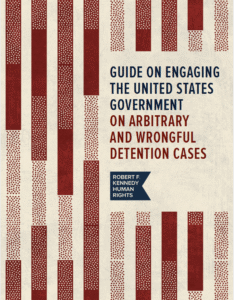(September 8, 2016 | Washington D.C.) Robert F. Kennedy Human Rights calls Bangladesh’s legislature to reject elements of The Digital Security Act of 2016, a draft cyber-security law that contains a number of vague and problematic provisions that can be used to restrict freedom of expression and legitimate human rights work. The law was approved on August 22, 2016 by Prime Minister Sheikh Hasina’s Cabinet and is currently pending approval by the Parliament.
According to Cabinet Secretary Mohammad Shafiul Alam, The Digital Security Act is intended “to check cybercrime,” including cyber-terrorism. The law would make punishable—potentially with life imprisonment—spreading false propaganda against the 1971 war or liberation from Pakistan or Sheikh Hasina’s father Sheikh Mujibur Rahman. The law would also set out prison terms for hurting religious sentiment, creating enmity or deteriorating law and order, and attacking with a computer or hacking secure information infrastructure. The draft law has already faced criticism from national human rights organizations for failing to define what constitutes “propaganda” and other important elements of these crimes.
“Passing laws aimed at curbing cyber-crimes and cyber-terrorism is important, but many of the provisions in this law extend well beyond that appropriate aim,” said Kerry Kennedy, President of Robert F. Kennedy Human Rights. “Inclusion of these broad and vague provisions is all the more concerning given Bangladesh’s ongoing practice of misusing existing laws to charge human rights activists and others for doing nothing more than stating facts about human rights violations taking place in the country. As it stands, this draft law is just another blunt instrument that the government can use to go after anyone it perceives as a threat to its power.”
In August 2013, prominent human rights defender Adilur Rahman Khan, the General Secretary of Odhikar, was arrested and charged with violating Section 57 of the Information and Communications Technology (ICT) Act of 2006, which sets out the punishment for “publishing fake, obscene or defaming information in electronic form.” The charges stemmed from Odhikar’s legitimate work investigating and reporting on governmental human rights abuses, especially relating to security forces crackdown that left a number of protesters dead. The proposed Digital Security Act of 2016 would absorb Section 57 of the ICT Act.
“There is every reason to believe that the new law, which would incorporate previously-misused provisions of the ICT Act, would be misused on the same way by the government to target human rights defenders,” said David McKean, Asia Program Officer for RFK Partners for Human Rights. “Section 57 should be removed from the draft legislation, and should be removed from the ICT Act as well. All other elements of this law must be adequately defined such that they cannot be misused by the government to silence protected speech or place other restrictions on the exercise of fundamental human rights.”




